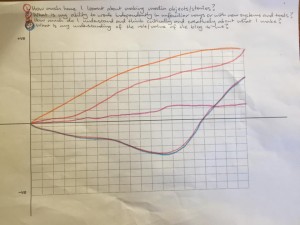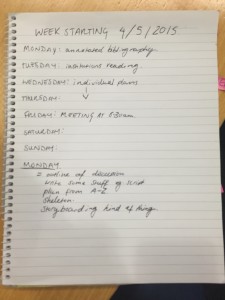Last ever workshop for the semester. I’m keen for holidays, if I’m terribly honest. So let’s get this show on the road.
My group didn’t come to the workshop this week, which was fine. It just meant that I had to present on my own. I didn’t mind because I got to talk to my hearts content about what we had filmed and the interesting subjects we had found. I showed some clips from our interviews and talked about how interesting their opinions were and how they were similar and different. I seemed to engage the class a bit, which was an awesome feeling and it made it feel like we were on track and we were making something spectacular. I felt so much better about the project brief after that and I even got a round of applause for all the time and effort we put in. That was really gratifying because for the last few weeks, my team and I had ran through the mill in getting all this ready and done.
Learning Graph:
I want to try and put my learning graph into words.


